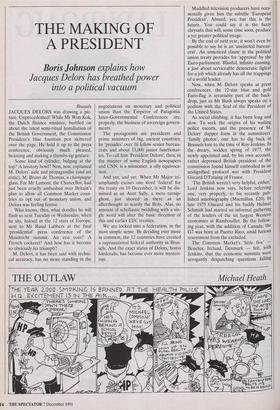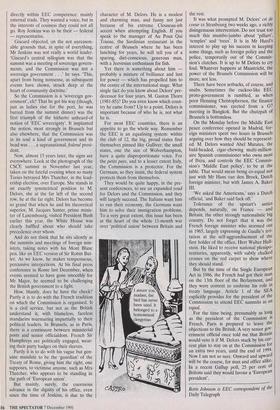THE MAKING OF A PRESIDENT
Boris Johnson explains how
Jacques Delors has breathed power into a political vacuum
Brussels
JACQUES DELORS was drawing a pic- ture. Unprecedented! While Mr Wim Kok, the Dutch finance minister, burbled on about the latest semi-ritual humiliation of the British Government, the Commission President's blue fountain pen skittered over the page. He held it up to the press conference, obviously much pleased, beaming and making a thumbs-up gesture.
Some kind of cylinder, bulging at the top? A lavatory bowl? Non, non, explained M. Delors' aide and propagandist (and art critic), M. Bruno de Thomas, a champagne glass. For Mr Lamont, the Chancellor, had just been cruelly ambushed over Britain's plan to allow all Common Market coun- tries to opt out of monetary union, and Delors was feeling festive.
Who knows, then, what doodles he will flash us next Tuesday or Wednesday, when he sits, haloed in the 12 stars of Europe, next to Mr Ruud Lubbers at the final `presidential' press conference of the Maastricht summit. An ecu coin? A French cockerel? And how has it become so obviously his triumph?
M. Delors, it has been said with techni- cal accuracy, has no more standing in the negotiations on monetary and political union than the Emperor of Patagonia. Inter-Governmental Conferences are, properly, the business of sovereign govern- ments.
The protagonists are presidents and prime ministers of big, ancient countries; he 'presides' over 16 fellow senior bureau- crats and about 13,000 junior functionar- ies. To call him 'President Delors', then, in the manner of some English newspapers and CNN, is a misnomer, a silly equivoca- tion.
And yet, and yet. When Mr Major tri- umphantly excises one 4ord 'federal' for the treaty on 10 December, it will be dis- missed as an Aunt Sally, a mere turnip- ghost, just shoved in there as an afterthought to scarify the Brits. Alas, no amount of scholiastic twiddling with a sin- gle word will alter the basic direction of this and earlier EEC treaties.
We are locked into a federation, in the most simple sense. By deciding ever more in common, the 12 countries have created a supranational federal authority in Brus- sels. And the exact status of Delors, homo foederalis, has become ever more mysteri- ous. Muddled television producers have occa- sionally given him the subtitle 'European President'. Absurd, yes; but this is the future. You could say it is the fuzzy chrysalis that will, some time soon, produce a yet greater political image.
By the end of next year, it won't even be possible to say he is an 'unelected bureau- crat'. An unnoticed clause in the political union treaty provides for 'approval' by the Euro-parliament. Blissful, infinite cunning: a just about serviceable democratic figleaf for a job which already has all the trappings of a world leader.
Now, when M. Delors speaks at press conferences, the 12-star blue and gold Euro-flag is invariably part of the back- drop, just as Mr Bush always speaks on a podium with the Seal of the President of the United States.
As social climbing, it has been long and slow. To seek the origins of his wailing police escorts, and the presence of M. Delors' dapper form in the summiteers' `family photos', one has to dig back in Brussels lore to the time of Roy Jenkins. In the dreary, sodden spring of 1977, the newly appointed and, by his own account, rather depressed British president of the commission found himself embroiled in an undignified protocol war with President Giscard D'Estaing of France. `The British weren't very helpful, either,' Lord Jenkins now says, before referring one, very properly, to his recently pub- lished autobiography (Macmillan, £20). In late 1975 Giscard and his buddy Helmut Schmidt had started an informal gathering of the leaders of the six largest Western economies at Rambouillet. By the follow- ing year, with the addition of Canada, the G7 was born at Puerto Rico, amid furious resentment from the excluded.
The Common Market's 'little five' — Benelux, Ireland, Denmark — felt, with Jenkins, that the economic summits were arrogantly despatching questions falling directly within EEC competence: mainly external trade. They wanted a voice, but in the interests of cosiness they could not all go. Roy Jenkins was to be their — federal — representative.
Giscard objected, on the not unreason- able grounds that, in spite of everything, Mr Jenkins was not really a world leader. `Giscard's central syllogism was that the summit was a meeting of sovereign govern- ments, and the Commission was not a sovereign government . . .' he says. 'This, apart from being nonsense, as subsequent events have shown, struck deep at the heart of community doctrine.'
So the Commission is a 'sovereign gov- ernment', eh? That he got his way (though, just as ladies rise for the port, he was barred from the summit dinner) was the first triumph of the hitherto unheard-of notion of 'EEC sovereignty'. It implanted the notion, most strongly in Brussels but also elsewhere, that the Commission was in its soul a kind of government and its head was . . a supranational, federal presi- dent.
Now, almost 15 years later, the signs are everywhere, Look at the photograph of the CSCE summit in November last year, taken on the fateful evening when so many Tories betrayed Mrs Thatcher, in the lead- ership election, over Europe. She stands in an exactly symmetrical position to M. Delors, she at the far left of the second row, he at the far right. Delors has become so grand that when he and his theoretical superior, M. Jacques Santer, prime minis- ter of Luxembourg, visited President Bush earlier this year, the White House was clearly baffled about who should take precedence over whom.
And do not think that he sits silently at the summits and meetings of foreign min- isters, taking notes with his Mont Blanc pen, like an EEC version of Sir Robin But- ler. As we know, he makes tempestuous, percussive interjections. At his final press conference in Rome last December, when events seemed to have gone smoothly for Mr Major, he seemed to be challenging the British government to a fight.
How, bluntly, does he have the cheek? Partly it is to do with the French tradition on which the Commission is organised. It is a civil service, but not as the British understand it, with blameless, faceless mandarins murmuring impartially to their political leaders. In Brussels, as in Paris, there is a continuum between ministerial posts and senior officialdom. French Sir Humphreys are politically engaged, wear- ing their party badges on their sleeves.
Partly it is to do with his vague but gen- uine mandate to be the 'guardian' of the Treaty of Rome, giving him the right, one supposes, to victimise anyone, such as Mrs Thatcher, who appears to be standing in the path of `European union'.
But mainly, surely, the enormous advance in the dignity of his office, even since the time of Jenkins, is due to the character of M. Delors. He is a modest and charming man, and funny not just because of his extreme Clouseau-ish accent when attempting English. If you speak to the manager of Au Poux Qui Tousse, the Sardinian restaurant in the centre of Brussels where he has been lunching for years, he will tell you of a sparing, diet-conscious, generous man, with a Jeevesian enthusiasm for fish.
Yet there is something about him probably a mixture of brilliance and lust for power — which has propelled him to the centre of the international stage. What single fact do you know about Delors' pre- decessor for four years, M. Gaston Thorn (1981-85)? Do you even know which coun- try he came from? Up to a point, Delors is important because of who he is, not what he is.
For most EEC countries, there is an appetite to go the whole way. Remember the EEC is an equalising system: within the club of 12, the big, proud states find themselves pinned like Gulliver; the small states, one the size of Wolverhampton, have a quite disproportionate voice. For the petits pays, and to a lesser extent Italy, the Commission is a protector. For the Germans, so they insist, the federal system protects them from themselves.
They would be quite happy, in the pre- sent conferences, to see an expanded road for Delors and the Commission, and they will largely succeed. The Italians want him to run their economy, the Germans want him to solve their immigration problems. To a very great extent, this issue has been at the heart of the whole 11-month war over 'political union' between Britain and the rest.
It was what prompted M. Delors' cri de coeur in Strasbourg two weeks ago, a richly disingenuous intervention. Do not trust too much this mumbo-jumbo about 'pillars', `temples' and 'trees'. It is in Mr Hurd's interest to play up his success in keeping some things, such as foreign policy and the police, temporarily out of the Commis- sion's clutches. It is up to M Delors to cry foul. Whatever happens at Maastricht, the power of the Brussels Commission will be more, not less.
There have been setbacks, of course, and snubs. Sometimes the cuckoo-like EEC proto-government is rumbled, as when poor Henning Christophersen, the finance commissioner, was ejected from a G7 meeting in Bangkok. But the chutzpah of Brussels is bottomless.
On the Monday before the Middle East peace conference opened in Madrid, for- eign ministers spent two hours in Brussels arguing over how they should be represent- ed. M. Delors wanted Abel Matutes, the bald-headed, cigar-chewing multi-million- aire Spanish commissioner who owns most of Ibiza, and controls the EEC Commis- sion's 'Middle East policy', to be at the table. That would mean being co-equal not just with Mr Hans van den Brock, Dutch foreign minister, but with James A. Baker III.
`We asked the Americans,' says a Dutch official, 'and Baker said fuck off.'
Tolerance of the upstart's antics depends, naturally, on France — and Britain, the other strongly nationalistic big country. Do not forget that it was the French foreign minister who stormed out in 1965, largely expressing de Gaulle's irri- tation at the self-aggrandisement of the first holder of the office, Herr Walter Hall- stein. He liked to receive national plenipo- tentiaries, apparently, with subtly chalked crosses on the red carpet to show where they should stand.
But by the time of the Single European Act in 1986, the French had got their man on the 13th floor of the Berlaymont, and they were content to enshrine his role in treaty language. Article 1 of the SEA explicitly provides for the president of the Commission to attend EEC summits as an equal.
For the time being, presumably as long as the president of the Commission is French, Paris is prepared to leave the objections to the British. A very senior gov- ernment official once told me that Britain would veto it if M. Delors stuck by his cur- rent plan to stay on at the Commission for an extra two years, until the end of 1994. Now I am not so sure. Onward and upward will be the course, for man and office alike. In a recent Gallup poll, 25 per cent of Britons said they would favour a 'European president'.
Boris Johnson is EEC correspondent of the Daily Telegraph



























































 Previous page
Previous page